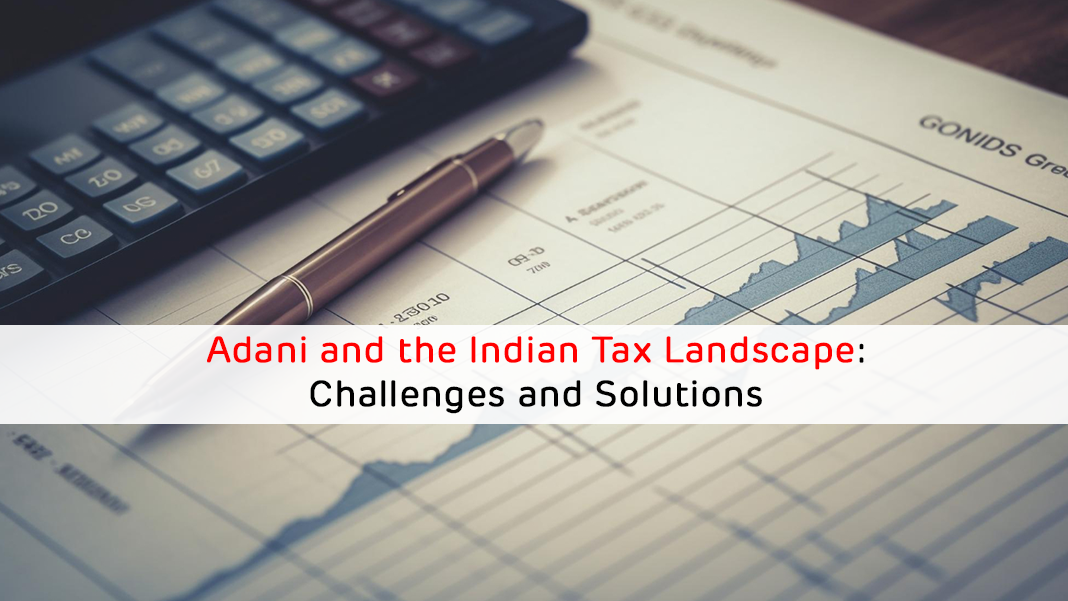Adani and the Indian Tax Landscape: Challenges and Solutions

The Adani Group is a diverse corporation that works via a network of companies and affiliates. Its interests range from ports and logistics to power production and infrastructure. Because of its organizational structure, Adani can manage several companies effectively, and each of its subsidiaries can concentrate on the industry to which it is most directly related. For instance, Adani Ports is responsible for the ports’ operations, while Adani Electricity is focused on producing electricity.
Although this structure is advantageous for operational efficiency, it adds complexity to the tax compliance process. Each subsidiary operates as its own legal company and is responsible for mitigating Adani tax evasion. As a result, the tax management team at Adani is accountable for overseeing compliance for each business, ensuring that all national and international tax requirements are adhered to.
Obstacles That Adani Must Overcome
- Pricing arrangements for international transactions and transfer pricing
Given the comprehensive nature of Adani’s foreign activities, ensuring that all inter-company transactions include fair and independent prices will be a substantial task. Concerns were raised, for instance, over the appropriate price tag for the transaction after Adani Ports had bought Krishnapatnam Port. The tax authorities subjected the transaction to a rigorous examination to ensure that it was carried out at a value consistent with the current market. This highlights the need to have pricing systems that are transparent and honest.
Transfer pricing restrictions are an essential component of international taxes, and the tax team at Adani will have to engage in thorough paperwork and research to establish compliance with these requirements.
- Taxation Policies That Vary Across States
Adani has a presence in several different states in India, and each of these states has its unique tax laws and rate structures. Because of this variety, maintaining compliance with state-level legislation regarding value-added tax (VAT) and entrance tax is a job that is made more difficult. For instance, a product sent from one state to another may be subject to different tax rates and criteria for entry depending on the destination state.
To overcome this obstacle, Adani has assembled a specialized team whose primary responsibilities include monitoring and observing state-level tax rules. This team works hand in hand with the governing bodies in the surrounding area to successfully negotiate the intricate regional tax legislation.
- Reforms to the Indirect Tax System
The Goods and Services Tax (GST) was first implemented in India in 2017, ushering in a profound change within the country’s indirect tax system. Although the GST has made the taxing procedure more efficient, Adani, like many other firms, had to undergo a transitional adjustment phase. It needed significant time and resources to ensure all subsidiaries smoothly transitioned to the new GST system.
Solutions
The tax management team at Adani was instrumental in easing the transition to the new GST regime by collaborating with tax consultants, executing the required adjustments in accounting systems, and leading internal training programs to educate staff about the changes.
- Innovative Technology and Comprehensive Data Analysis Solutions to the Adani Problem
To improve its attempts to comply with tax laws, the Adani Group invests in cutting-edge technology. This covers the integration of data analytics tools as well as the deployment of complex enterprise resource planning (ERP) systems. These technologies are vital in assuring proper transfer pricing, facilitating the monitoring of transactions, and creating complete data for Adani tax evasion authorities.
By drawing on cutting-edge technologies, Adani dramatically increases its capacity to keep transparent and compliant tax records across its varied businesses.
- Administration of Taxes Centralized
The Adani Group is taking a strategic step toward ensuring all its companies adhere to the same compliance standards by establishing a centralized tax management team. This group would supervise tax-related concerns, which include collaborating with tax authorities, keeping up to date on changes to regulatory requirements, and putting in place the most effective procedures to avoid Adani tax evasion issue.
As a result of better control and coordination made possible by centralization, The Group feels that it can be sure that all of its subsidiaries agree with the comprehensive tax strategy and continue following all relevant laws and regulations.
- Interaction with the Relevant Tax Authorities
Adani must have an open line of contact and a positive tone with the relevant tax authorities. To do this, it is necessary to schedule recurring meetings and conversations with the employees to address any problems or questions. Adani is better positioned to pre-emptively address any issues and work toward favourable solutions for both parties if it maintains an open and collaborative relationship with tax authorities.
Adani’s engagement with tax authorities displays the company’s dedication to compliance and transparency, which can improve the company’s position within the regulatory environment.
- Ongoing Instruction and Instructional Programs
It is of the utmost importance for Adani to ensure that its personnel get ongoing training and education, given the fluid nature of tax legislation. This guarantees that every company member is up-to-date on the most recent compliance regulations and practices considered the most effective. Training programs may include various subjects, some examples of which are recent updates on tax legislation, transfer pricing standards, and other areas of relevance.
Conclusion
Adani enhances its internal capacities by investing in the continual education of its employees. This cultivates a culture of compliance and ensures that they are ready to negotiate the complexity of the tax environment, thereby avoiding Adani tax evasion issue. Not only can Adani successfully handle its responsibilities with the help of these preventative measures, but the company can also serve as a model for other companies that operate in situations that are just as difficult. Adani can maintain its central position in India’s ongoing economic growth narrative if it prioritizes compliance and transparency.
Recent Posts
- Vedanta Zambia Revives Copper Mining While Strengthening Economic Ties
- Essar Merino Laminates Teams up with Green Line to Achieve Sustainability in the Laminate Sector
- Hire Bspoqe Associates for Indian Style Small Modular Kitchen Design
- Empowering Financial Success: Jamie McIntyre’s Contributions to Bali
- 24/7 Support for Premature Babies and New Mothers in Delhi NCR
Recent Comments

Vedanta Zambia Revives Copper Mining While Strengthening Economic Ties

Hire Bspoqe Associates for Indian Style Small Modular Kitchen Design

Empowering Financial Success: Jamie McIntyre’s Contributions to Bali

Sahara small depositors get some relief as govt raises refund limit to ₹50,000 from ₹10,000. Details here

Vedanta Zambia Revives Copper Mining While Strengthening Economic Ties

Essar Merino Laminates Teams up with Green Line to Achieve Sustainability in the Laminate Sector

Hire Bspoqe Associates for Indian Style Small Modular Kitchen Design

